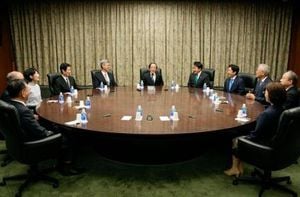Walmart, America’s largest retailer, is making headlines once again, but this time, it’s facing backlash over significant changes to its diversity, equity, and inclusion (DEI) initiatives. Recent announcements indicate the company will not renew its five-year commitment to the Center for Racial Equity and will also withdraw from the Human Rights Campaign’s Corporate Equality Index, which rates businesses on LGBTQ+ equality. This move has stirred controversy and prompted varied reactions from civil rights advocates and the general public alike.
The decision to scale back on DEI policies seems to be part of Walmart's broader strategy to contend with pressures from conservative activists. Robby Starbuck, an influential anti-DEI activist, took credit for Walmart’s recent changes, stating via social media, "Walmart smartly decided to just fix this together. I encourage other companies to work with us to do the same.” Given Walmart’s massive employment base, these adjustments could set trends for other corporations bracing for potential shifts influenced by public sentiment and lobbyist pressure.
Marc Morial, the CEO of the National Urban League, expressed his dismay on CBS Mornings, stating, "I think what they did is succumb to a smear campaign, to threats, to bullying, and to blackmail by a handful of extremists.” Morial emphasized the importance of consulting stakeholders before implementing such drastic changes, reiterably claiming, “This retreat from support for diversity, equity, and inclusion is disappointing and detrimental.” He also indicated active communication with Walmart leaders to discuss the rationale behind these sweeping policy alterations.
Commentators have pointed out how this signals not just Walmart’s attitude but reflects wider currents among U.S. businesses re-evaluated through the lens of increasing legal and political scrutiny surrounding supportive programs for marginalized groups. Of course, these decisions are not occurring in isolation; they follow the Supreme Court’s controversial ruling against affirmative action, which presented a significant obstacle to many DEI initiatives nationwide.
The specifics of Walmart's revamp are telling. The elimination of funding for the Center for Racial Equity was positioned as part of the company's strategy to create more accessible opportunities for all its associates and customers. Walmart U.S. CEO John Furner maintained, "Every decision is grounded in wanting to open doors to opportunities for all our associates, customers, and suppliers and to be Walmart for everyone." Yet, the move begs the question of how effectively they aim to fulfill such ideals without DEI frameworks.
Another significant aspect of the announcement is the company's plan to cease using the term “LatinX” and to discontinue diversity training for employees. Retail worker advocates argue these moves undermine progress achieved over the years, particularly at large corporations like Walmart, which have historically lagged behind others on inclusive practices. The focus on eliminating terms and phrases associated with privilege and diversity may jeopardize recruitment efforts, especially among communities of color who could feel alienated by these messages.
Walmart’s DEI rollback isn’t just about terminology or funding cuts. It reflects the growing pressure companies face to abandon or dial back their diversity efforts due to changing societal views influenced by political factions. Alongside Walmart, several other major corporations have been reassessing or modifying their DEI initiatives under similar pressures, marking the beginning of what could be perceived as the “deconstruction” of corporate diversity commitments.
Civil rights leaders underline the gravity of the situation. A coordinator from the Shasta Equal Justice Coalition, Sharon Brisolara, proclaimed the changes could hinder cultural education and mutual respect within communities. Brisolara stated, “It causes us to ignore or not pay attention to the experiences and needs of more vulnerable populations.” This viewpoint signals concerns over reverting societal progress aimed at enhancing community support and fostering dialogues around equality.
Importantly, the fallout from this decision is not just economic; it has cultural ramifications. Institutions created to support various communities may struggle to engage effectively when major players like Walmart step back. Morial and others argue this not only reverses the progress made since the aftermath of George Floyd’s tragic death but may also embolden other companies to follow suit. He urged, “We need diverse perspectives to look at what’s the root of the problem, and what are some of those potential solutions.”
The complexity surrounding Walmart’s DEI decisions showcases just how intertwined corporate strategies have become with societal movements and political environments. Looking beyond Walmart, this could suggest growing pains across corporate America as businesses navigate changing societal norms and expectations.
Many industry experts are keeping their eyes peeled on what these developments could foreshadow for the future. Will Walmart face backlash from progressive communities and consumers spurred by its decisions? Will there be calls for boycotts akin to those seen earlier against the company on other issues? The outcome remains uncertain.
This situation highlights how core values within corporations can shift as external pressures mount. Walmart's prior commitments to diversity and inclusion led to national praise, marking it as one of the frontrunners addressing systemic inequalities. The current retraction, particularly after years of positive strides, prompts serious discussions about the role such commitments hold within corporations moving forward.
“At its core, diversity, equity, and inclusion were established to create opportunities for everyone,” Morial concluded. Now, as entities like Walmart reassess their policies, the spotlight remains firmly on the fundamental question: Who truly benefits when companies like Walmart take such pivotal turns?
The depth of responses to Walmart’s decision will likely resonate for years to come, prompting continuous dialogues around corporate responsibility, inclusivity, and how communities at large—especially vulnerable populations—adapt to these changes.



